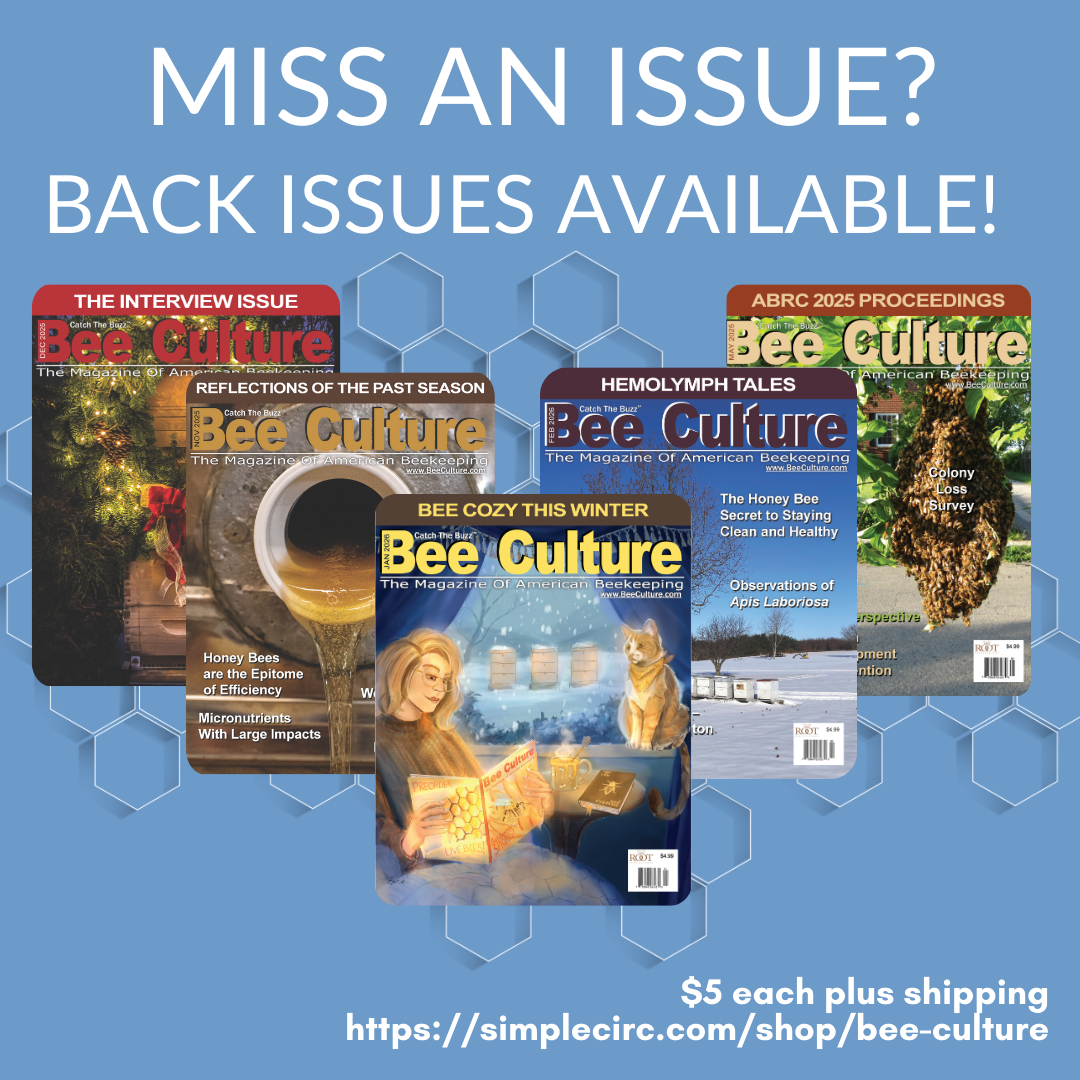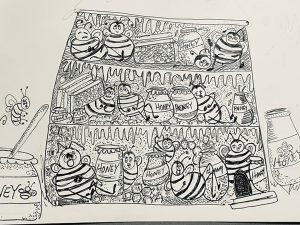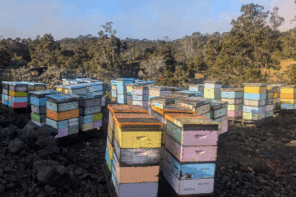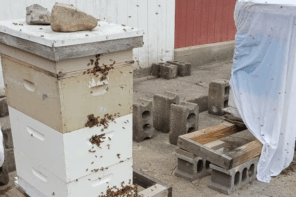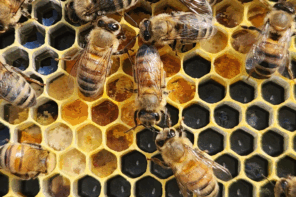John A Fraser III1
The June 2021 Bee Culture included an article by Pamela Parker quoting a number of beekeepers and honey producers and sellers. Uniformly, they cried out for a legal remedy for products offered to consumers as “honey” that are in fact concoctions of some honey and other products. In the law, this is called “misbranding” and “adulteration.” There is a legal remedy.
As Bee Culture readers will know, honey is a “thick, sweet, syrupy substance that bees make as food from the nectar of flowers and store in honey combs.” To simplify, “misbranding” occurs when a food package is labeled as honey and yet it contains other substances.i “Adulteration” occurs when a packer of honey includes substances other than honey and yet attaches a label claiming that the product is honey.ii
The U.S. Food and Drug Administration (FDA) is charged with enforcing the Food, Drug & Cosmetic Act (FD&C Act),iii which has been on the books for over 100 years. The FDA has the power to adopt definitions and other regulations that define what is permissible under U.S. law in regard to the marketing of honey as a food. The FDA also has the power to bring enforcement actions against violators in the federal courts.
However, the FDA is not the only source of enforcement of the FD&C Act. A competitor who is harmed by misbranding or adulteration of honey can also sue to enforce the FD&C Act by invoking the enforcement powers of the Lanham Act.iv See POM Wonderful LLC vs. Coca Cola Co., a 2014 U.S. Supreme Court decision.v Under the Lanham Act, honey producers (for example) who can prove certain facts can sue competitors to stop misbranding and adulteration and to recover damages. [Consumers – people who buy honey for personal consumption – can also sue under a variety of state laws that are not covered in this article.]
WHO IS A COMPETITOR?
A competitor is a business that offers the same (or a a very similar) product for sale in the U.S. market (often defined by wholesale or retail segment) and that is affected by the unlawful practices of another business. If you sell honey, a seller of honey products whose unlawful practices undercut your honey price is a competitor. A seller of honey who makes a greater profit by misbranding or adulteration of honey in your market is also a competitor.
WHAT DOES A HONEY PRODUCER HAVE TO PROVE TO WIN?
As the core of a Lanham Act case for misbranding or adulteration, you have to prove that the competitor has offered “honey” for sale in commercial quantities, that the product has been misbranded and/or adulterated, that the competitor was able to undercut competition and/or achieve greater profit margins by this conduct, that the competitor was given 60 days’ written notice to cease and desist, and that the competitor continued the misconduct. You also have to show how this damaged your business.
You should also expect to prove that your honey business offered a properly-labeled and packaged product, and that you gave the written notice to the competitor to cease and desist, and that your business was damaged by reduced sales – or that the competitor achieved greater profits at lower cost by cheating. In particular lawsuits, your honey business will have to provide proof to satisfy other evidentiary requirements that are determined by the facts of each case.
IS EXPERT TESTIMONY NEEDED?
You need to be prepared to have a knowledgeable expert(s) testify about how the practices of the competitor cause harm, how wholesale buyers or consumers were misled, and what profits were achieved by the shabby practices that your suit challenges. The profits achieved by cheating are just one measure of damages. Other issues may come up that require expert testimony from beekeepers, chemists, accountants, competitors, and consumer survey experts.
HOW MUCH DOES IT COST TO PROSECUTE A SUIT?
Federal lawsuits against competing businesses will cost thousands of dollars to initiate and tens of thousands of dollars to pursue. But, when a lawsuit is successfully resolved, the other side should be required to pay for the privilege of having its business practices corrected.
WHAT IF A HONEY PRODUCER’S LABELING/PACKAGING IS NOT PERFECT?
Before casting stones at someone who packages, labels and sells honey, make sure that your own packaging and labeling is correct. It is hard to convince a judge to grant relief to someone who engages in similar bad practices. As a competitor, your business can receive a Lanham Act suit as well.
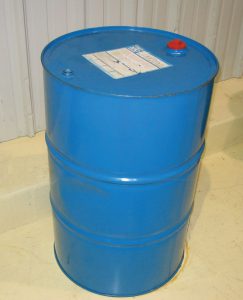 CAN COMPETITORS BAND TOGETHER TO OBTAIN RELIEF?
CAN COMPETITORS BAND TOGETHER TO OBTAIN RELIEF?
The Lanham Act provides a class action remedy where a group of honey producers (for example) can file a suit to seek damages and other relief against a single defendant or a group of defendants who have engaged in similar misconduct. Please note that federal class action relief is much sought-after and only sometimes achieved. Instead of complex class suits, it is sometimes better to file multiple lawsuits in the same court against one defendant and then manage costs and effort through one managing counsel. The managing counsel coordinates strategy and timing, as well as aiming for cost control.
HAS THIS BEEN DONE BEFORE FOR HONEY?
Yes. The footnote contains citations to legal reports available online of honey misbranding and adulteration cases under the FD&C Act and the Lanham Act.vi
CAN THIS BE DONE WITHOUT A LAWYER?
The short answer is “no.” If your business is going to sue another business under federal law, 99.99% of the time, you will be in federal court with an experienced litigator. If you can master the fraud pleading and proof requirements of Federal Rule of Civil Procedure 9 under the Lanham Act, without a lawyer, then you may be able to do without an attorney. Because this is a difficult task for an accomplished litigation attorney, few business owners will attempt Lanham Act litigation without an attorney.
WHAT DO YOU GET IF YOU WIN?
Injunctive relief (an enforceable court order stopping the misbranding or adulteration), money damages, and costs of suit. The Lanham Act doesn’t give much guidance on when attorneys’ fees may also be awarded: “The court in exceptional cases may award reasonable attorney fees to the prevailing party.”vii Therefore, experienced attorneys will include additional causes of action in the complaint to support an award of attorneys’ fees to the prevailing party.
WHAT PERCENTAGE OF THESE CASES SETTLE WITHOUT TRIAL?
Very few of these cases go to trial because – once the facts are clear – there is not a great benefit to a trial and trials are costly. Over 95% of these cases settle.
HOW DOES A HONEY PRODUCER FIND AN ATTORNEY COMPETENT TO PROSECUTE A LANHAM ACT SUIT?
Presumably, you have had legal work done for your business by a competent lawyer who has handled business formation and liability issues. Ask her to refer you to a federal litigator who is competent in this field. If not, then ask your local or county Bar Association to give you a referral to an attorney who conducts federal civil litigation. Do not pay a penny for the referral or for the initial consultation with counsel. If an attorney will not meet with you for an initial evaluation without payment, then you have found the wrong attorney.
IS THIS LEGAL ADVICE ?
No. This is very generalized legal information. To determine if it applies to your business, or if it is remotely useful, you need to give this article to a competent federal litigator and provide factual information about your business and how it is being harmed by competitors. That can lead to legal advice.
THERE IS A REMEDY
At the start of the article, the June 2021 Bee Culture article by Pamela Parker was referenced. The honey producers in that article provided examples of harm caused by a variety of shabby honey marketing practices that harm honest businesses and generate profits for their competitors. This article points the way to a remedy for those wrongs.
1B.A., J.D., LL.M. The author is a U.S. Administrative Law Judge and beekeeper in Western Pennsylvania. The views expressed herein are entirely those of the author.
iFood Drug & Cosmetic Act, 21 U.S.C. Section 343(i); 21 CFR 102.5(a)
iiFood Drug & Cosmetic Act, 21 U.S.C. Section 342
iii21 U.S.C. Section 301 et seq.
iv15 U.S.C. Section 1051 et seq.
vPOM Wonderful LLC v. Coca-Cola Co., 573 U.S. 102 (2014)(a statutory private right of action under the Lanham Act is available to a competitor to enforce regulatory provisions of the Food, Drug, and Cosmetic Act.)
viSee, e.g., Brod v. Sioux Honey Ass’n., 2015 WL 394282)(9th Cir. 2015); Pierce et al. vs. North Dallas Honey Co., No. 3: 19-CV-00410-X (N.D. Texas 2020); Pope vs. Kroger Co., 2020 WL 3402223 (S.D. Ohio); Romero v. Flowers Bakeries, LLC, 2015 WL 2125004 (N.D. Cal. 2015); In re Honey Transhipping Litigation, 87 F.Supp. 3d 855 (N.D. Ill. 2015).
vii15 USC § 1117(a)

